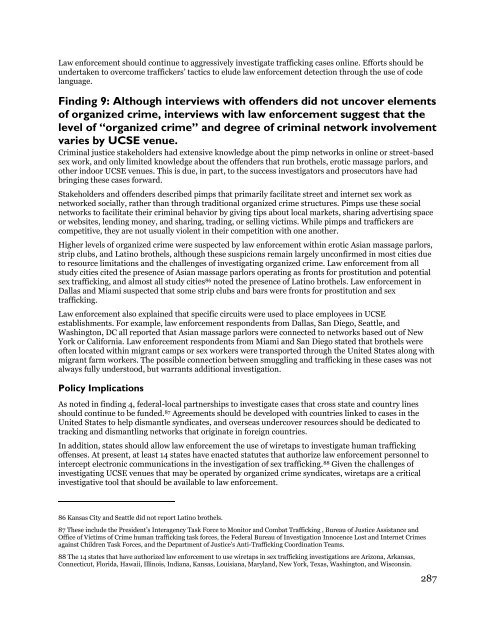413047-Underground-Commercial-Sex-Economy
413047-Underground-Commercial-Sex-Economy
413047-Underground-Commercial-Sex-Economy
Create successful ePaper yourself
Turn your PDF publications into a flip-book with our unique Google optimized e-Paper software.
Law enforcement should continue to aggressively investigate trafficking cases online. Efforts should be<br />
undertaken to overcome traffickers’ tactics to elude law enforcement detection through the use of code<br />
language.<br />
Finding 9: Although interviews with offenders did not uncover elements<br />
of organized crime, interviews with law enforcement suggest that the<br />
level of “organized crime” and degree of criminal network involvement<br />
varies by UCSE venue.<br />
Criminal justice stakeholders had extensive knowledge about the pimp networks in online or street-based<br />
sex work, and only limited knowledge about the offenders that run brothels, erotic massage parlors, and<br />
other indoor UCSE venues. This is due, in part, to the success investigators and prosecutors have had<br />
bringing these cases forward.<br />
Stakeholders and offenders described pimps that primarily facilitate street and internet sex work as<br />
networked socially, rather than through traditional organized crime structures. Pimps use these social<br />
networks to facilitate their criminal behavior by giving tips about local markets, sharing advertising space<br />
or websites, lending money, and sharing, trading, or selling victims. While pimps and traffickers are<br />
competitive, they are not usually violent in their competition with one another.<br />
Higher levels of organized crime were suspected by law enforcement within erotic Asian massage parlors,<br />
strip clubs, and Latino brothels, although these suspicions remain largely unconfirmed in most cities due<br />
to resource limitations and the challenges of investigating organized crime. Law enforcement from all<br />
study cities cited the presence of Asian massage parlors operating as fronts for prostitution and potential<br />
sex trafficking, and almost all study cities 86 noted the presence of Latino brothels. Law enforcement in<br />
Dallas and Miami suspected that some strip clubs and bars were fronts for prostitution and sex<br />
trafficking.<br />
Law enforcement also explained that specific circuits were used to place employees in UCSE<br />
establishments. For example, law enforcement respondents from Dallas, San Diego, Seattle, and<br />
Washington, DC all reported that Asian massage parlors were connected to networks based out of New<br />
York or California. Law enforcement respondents from Miami and San Diego stated that brothels were<br />
often located within migrant camps or sex workers were transported through the United States along with<br />
migrant farm workers. The possible connection between smuggling and trafficking in these cases was not<br />
always fully understood, but warrants additional investigation.<br />
Policy Implications<br />
As noted in finding 4, federal-local partnerships to investigate cases that cross state and country lines<br />
should continue to be funded. 87 Agreements should be developed with countries linked to cases in the<br />
United States to help dismantle syndicates, and overseas undercover resources should be dedicated to<br />
tracking and dismantling networks that originate in foreign countries.<br />
In addition, states should allow law enforcement the use of wiretaps to investigate human trafficking<br />
offenses. At present, at least 14 states have enacted statutes that authorize law enforcement personnel to<br />
intercept electronic communications in the investigation of sex trafficking. 88 Given the challenges of<br />
investigating UCSE venues that may be operated by organized crime syndicates, wiretaps are a critical<br />
investigative tool that should be available to law enforcement.<br />
86 Kansas City and Seattle did not report Latino brothels.<br />
87 These include the President’s Interagency Task Force to Monitor and Combat Trafficking , Bureau of Justice Assistance and<br />
Office of Victims of Crime human trafficking task forces, the Federal Bureau of Investigation Innocence Lost and Internet Crimes<br />
against Children Task Forces, and the Department of Justice’s Anti-Trafficking Coordination Teams.<br />
88 The 14 states that have authorized law enforcement to use wiretaps in sex trafficking investigations are Arizona, Arkansas,<br />
Connecticut, Florida, Hawaii, Illinois, Indiana, Kansas, Louisiana, Maryland, New York, Texas, Washington, and Wisconsin.<br />
287


